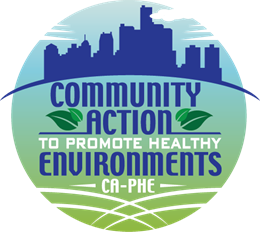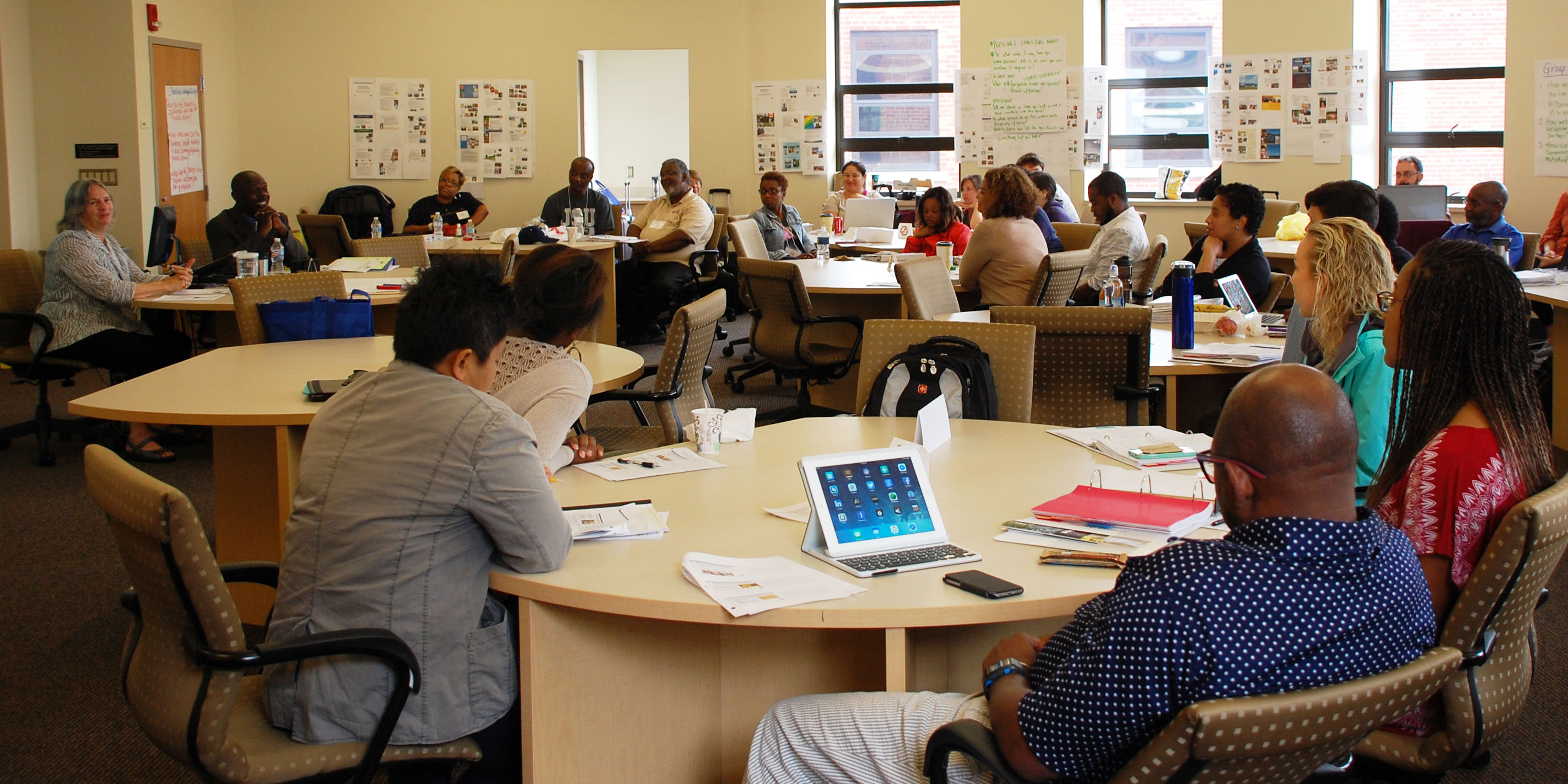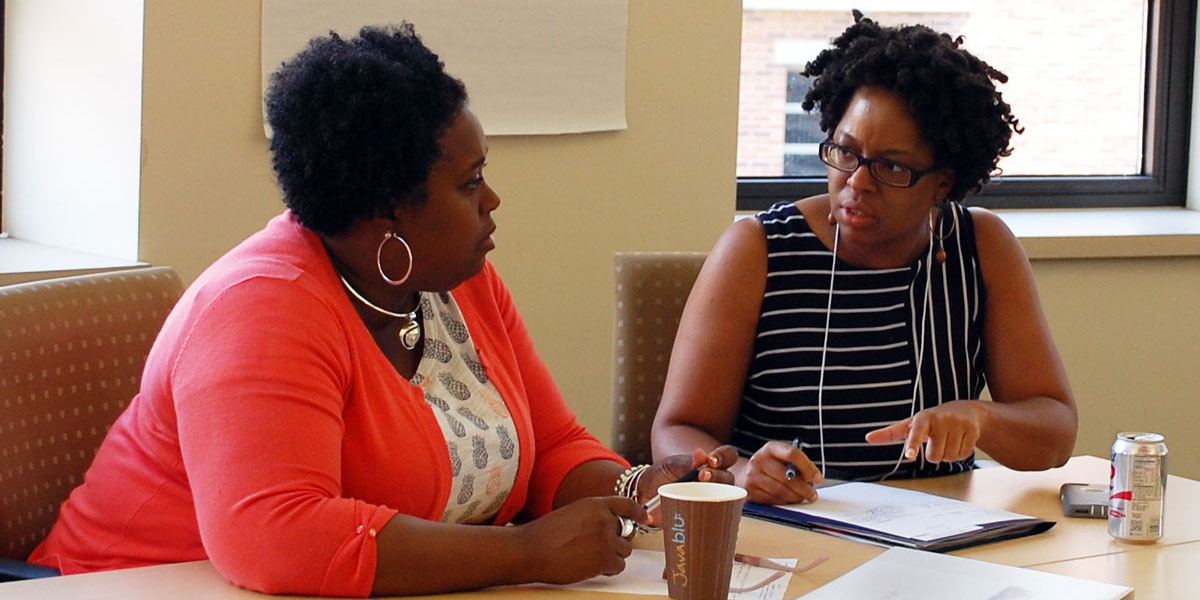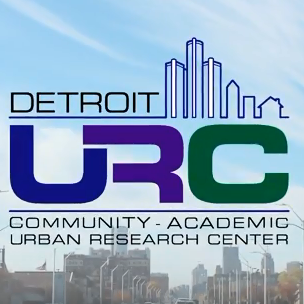Please revisit this webpage for details about our new nationwide Community-Based Participatory Research (CBPR) Academy!
PRESS RELEASE: Announcing Community Action to Promote Healthy Environments (CA-PHE)
 This is a partnership involving three existing Detroit URC affiliated partnerships (see partners below).
This is a partnership involving three existing Detroit URC affiliated partnerships (see partners below).
The specific aims of the partnership are to:
- Gather data and to understand the factors influencing air quality;
- Translate that data into meaningful recommendations and best practices to improve air quality in Detroit; and
- Create an action plan and policy recommendations aimed at reducing the effects of air pollution on residents' health.
Partners
- Detroiters Working for Environmental Justice
- Southwest Detroit Environmental Vision
- Detroit Hispanic Development Corporation
- UM Schools of Public Health
- Detroit Community-Academic Urban Research Center
- Healthy Environments Partnership
- Community Action Against Asthma

This partnership between community members and academic researchers conducted a health impact assessment (HIA), which brought together stakeholder input, scientific data, and public health expertise to inform decisions of Detroit Future City (DFC). DFC is a strategic framework to guide the regeneration of Detroit.
A key strategy of DFC is to target city service and infrastructure investments—such as water systems, street lighting, roads, and blight removal—toward more populated parts of the city, and to reduce repairs and maintenance in higher vacancy areas. While greater investments may stabilize more populated neighborhoods and improve safety, further disinvestment in less populated neighborhoods may increase their exposure to stress, isolation and environmental hazards which contribute to poor health.
To address this concern, D-HIA examined the framework’s potential impact on high vacancy neighborhoods and the 90,000 people who live there, through changes in:
- Neighborhood Stability and Integrity of the social fabric and related built environment, including social networks, proximity of neighbors, and social cohesion.
- Neighborhood Safety, such as vacancy, blight, and crime.
- Environmental Conditions related to housing and contamination of air, soil, and water.
- Displacement, Relocation, and Gentrification on those who move or stay.
Potential health impacts include heart disease, violence, asthma, lead poisoning, cancer, homelessness, and mental health. Both beneficial and detrimental effects were identified, as well as impacts on vulnerable groups and equity.
The full HIA Report describes the objectives and methods used to carry out the HIA, current health and neighborhood data, key findings, and recommendations for protecting health of neighborhoods and the people who live there. The HIA provides health data to inform DFC and other regeneration planning efforts. It also considers lessons learned for integrating health and equity into planning for revitalizing shrinking cities.
The D-HIA partnership continues to work with a broad range of groups to implement the HIA recommendations, strengthen cross-sectoral relationships, and enhance capacity of community, city officials, public health, and others to consider health and equity in planning decisions.
D-HIA Reports:
Partners:
- Kurt Metzger, Director Emeritus of Data Driven Detroit
- Detroit Hispanic Development Corporation
- Eastside Community Network
- Detroiters Working for Environmental Justice
- Green Door Initiative
- Institute for Population Health
- University of Michigan School of Public Health
- University of Michigan Urban and Regional Planning Program
- Ben Cave Associates Ltd
For more information, please contact Chris Coombe (734) 763-9236 This email address is being protected from spambots. You need JavaScript enabled to view it.. Also, for additional related resources , visit our Health Impact Assessment Resources page.
*This project was supported by a grant from the Health Impact Project, a collaboration of the Robert Wood Johnson Foundation and The Pew Charitable Trusts, and by a grant from the University of Michigan Center for Advancing Research and Solutions for Society (CARSS).
| Funding Source | Prevention Grant from Centers for Disease Control and Prevention (CDC); Research Grant from the CDC, the Department of Justice and Violence Against Women Act (VAWA) |
| Goals & Objectives: | To demonstrate the effectiveness of a community-based intervention aimed at building community capacity to address the problem of intimate partner violence against Latina women. LA VIDA also provides service to community members in need of legal assistance under the VAWA. |
| Communities Involved: |
Hispanic women, men, and youth/children residing in southwest Detroit; medical providers; CBOs, churches and other southwest Detroit community groups. |
| Partners: | CHASS; Latino Family Services; Southwest Counseling and Development Services; Vistas Nuevas Head Start; Cabrini Clinic; Women's Cultural Collaborative; Detroit Police Deptartment; Wayne County Family Independence Agency; First Step; UM School of Public Health; CDC. |
| Intervention: | Four full-time staff provide support for 4 program components: Community Education; Training for Agency Staff; Family Support (support groups, counseling, men's intervention); Children/Youth, including school and agency-based prevention programs; and legal assistance for qualified members of the community. |
| Outcome Indicators: | Individual level: increased knowledge about IPV risk factors; more women screened, diagnosed, treated, referred. Organizational level: increased IPV coordination. Community level: increased social support for women. Policy level: increased knowledge about IPV policies for immigrant women. |
| Methods & Analyses: | Pre-post knowledge/skill assessments; process evaluation using client contact records; in-depth interviews; annual survey of Steering Committee members. |
| Results: | 450 abused Hispanic women seen by LA VIDA to date; other data collection ongoing. Formative research (8 focus groups with Hispanic women, 6 groups with Hispanic men) to plan the program. Since August (2000), more than 1,000 Hispanic Women seen by LA VIDA. Other formative research with non-offending Hispanic males with emphasis of prevention. |
| Funding Source | Health Services and Research Administration (HRSA/Maternal and Child Health Bureau) (2006-2009) |
| Goals & Objectives: |
|
| Communities Involved: |
Spanish-speaking Latino women receiving prenatal and postpartum care and CHASS. |
| Partners: | CHASS, Detroit Department of Health and Wellness Promotion, Michigan Department of Community Health, Southwest Solutions, UM-Schools of Social Work, Public Health, Nursing, and Medicine. |
| Intervention: | Women's Health Advocates (WHAs) lead culturally tailored, English and Spanish language home and group curriculum and social support/activity meetings, and team with CHASS clinicians and participants at key clinic visits, to develop social support, sense of empowerment, knowledge and skills needed for healthy eating, regular exercise and stress management and healthy pregnancy, childbirth and postpartum outcomes. |
| Outcome Indicators: | Behavioral and weight outcomes: At 6 months, postpartum, Increased physical activity, fruit, vegetable and fiber consumption; decreased simple sugar, trans and saturated fat consumption; appropriate pregnancy weight gain and postpartum weight loss; positive changes in beliefs and attitudes regarding weight, eating and exercise; increased social support and improvements on markers of stress and depression. Process outcomes: program fidelity; adequate recruitment and retention; participant, host site and WHA satisfaction; replicable and sustainable materials and methods. |
| Methods & Analyses: | Non randomized, pre-post longitudinal evaluation design; measures include weight, waist and hip circumference, blood pressure; physical activity, dietary and weight-related beliefs, attitudes, knowledge and behaviors, measures of social support, stress, depressive symptoms; beliefs and attitudes. Assessments at baseline, and following pregnancy and postpartum intervention phases, by questionnaires, physical measurements, clinical lab and birth outcome data and pedometer steps. Process evaluation measures assessed by observations, questionnaires and focus groups with quantitative and qualitative data collection and analyses. |
| Results: | Data collection and analysis in progress. |











![[USE THIS] 2017 DWEJ logo_Horizontal](/cache/widgetkit/gallery/44/[USE THIS] 2017 DWEJ logo_Horizontal-64638c1e16.png)
